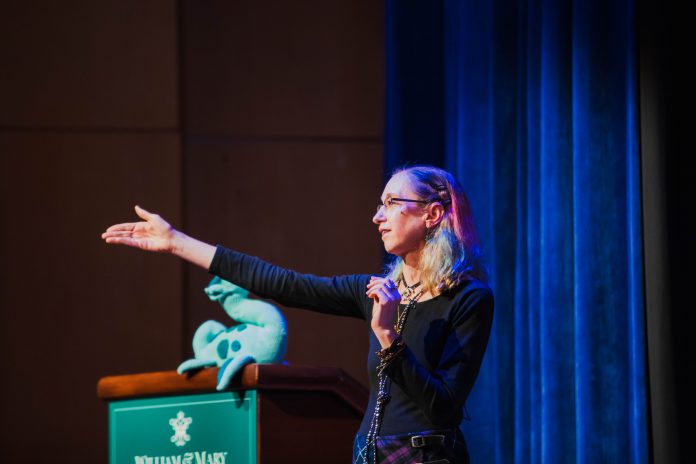Thursday, Oct. 27, students, faculty, alumni and members of the greater Williamsburg community filled Sadler Center’s Commonwealth Auditorium to hear Georgia Irby, professor of Classical Studies at the College of William and Mary. Her lecture, “Sea Monsters! ‘O Brave new seas that have such monsters in them,’” was the nineteenth segment of the ongoing Tack Faculty Lecture Series, a recent tradition at the College.
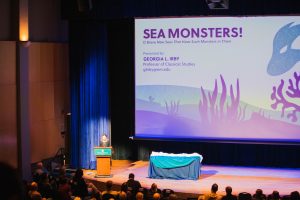
Named after Martha and Carl Tack, both members of the class of 1978, the William and Mary Tack Lecture Series allows professors to present their work to the community and receive a stipend. Every tack lecture is free to attend and open to all. Tack lectures typically occur once per semester, highlighting the unique research and scholarship of the selected professor.
The evening began with an introduction from Provost Peggy Agouris. She discussed the Tack Lecture series and Irby’s work. Agouris spoke about how the intellectual energy bustling around campus stems from the creative work of the faculty as they lead students in their quest for knowledge. She named the Tack lecture series as one of her favorite community events at the College.
“We do a lot of things that bring the community together to enjoy the work that is happening,” Agouris said. “This one is my favorite because there is no theme. Every year we have something different, and all these things demonstrate how cool it is what our faculty are doing in the lab, in the classroom, in their research and their scholarship.”
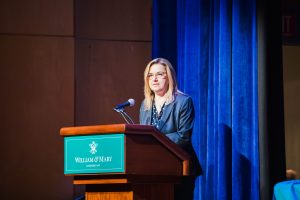
Agouris then invited Irby to the stage. At the start of her lecture, Irby expressed gratitude for being selected as a speaker for the series, and she thanked members of the Classics Club, the Tack team and Mr. and Mrs. Tack. Finally beginning her lecture, Irby opened with a statement about the complex depictions of sea monsters across diverse cultures and throughout time.
“Sea monsters are irresistible,” Irby said. “From Jonah’s whale to Nessie, sea monsters continue to captivate the imagination. They are products of human creativity and they corporealize the dangers for sailors who do not naturally belong in the watery realm. But in ancient art, they can also be endearing as companions and pets for marine gods and goddesses whose natural abode is the water.”

Student helpers from the College’s Classics Club assisted Irby throughout the evening. They each took turns presenting plush sea monsters and oceanic creatures to Professor Irby at her podium. As they presented Irby with a Loch Ness Monster plushie, she recalled her time in Inverness, Scotland.
Irby mentioned her first encounter with a sea monster: her informal pilgrimage to see Nessie as a graduate student. Most of her talk, however, focused on sea monsters of the ancient world and the Mediterranean.
Irby’s lecture informed the audience of ancient Mediterranean land-sea hybrid animals, mythical oceanic creatures and classic serpentine monsters. Learning about these legends fascinated and inspired many in attendance.
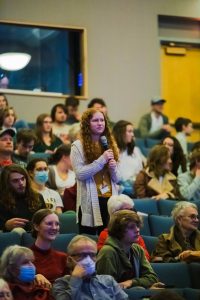
One of the student assistants with the Classics Club, Ryan Vincent ’23, explained that the lecture related to his honors thesis and his studies with the Classical Studies department.
“For my honors thesis, I’m doing a lot of work with the connections between Bronze Age Greece and Bronze Age Egypt,” Vincent said. “There’s a body of water in the middle, so I’ve had to do a lot of research into how things made it across the ocean. When examining what’s crossing the sea, according to the Greeks, you’re going to encounter a lot of sea monsters. Being able to learn about some of the creatures that I have seen and will continue to see was just fantastic.”
Irby’s lecture ended as she played “Octopus’s Garden” by the Beatles while projecting videos of fish and other marine animals. After the short music break, Irby opened the floor to questions from the audience, and many in attendance were eager to learn more about Irby’s work and opinions.
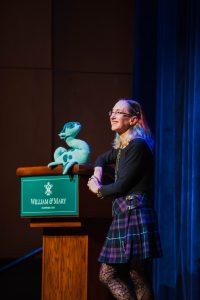
Regarding the stories of Ancient Greece and Rome, Irby emphasized the importance of keeping an open mind when learning about the deadly monsters of the sea. Following her lecture, Irby explained that the Greeks knew the water well but lacked the technology to fully understand it.
“They don’t have electron microscopes and cell phones and telescopes that can see millions and millions of light-years away,” Irby said. “They’re able to come up with these marvelous explanations and ideas about what these creatures are, how they work, what they’re doing.”
Irby noted that the biggest takeaway of the evening was to enjoy the stories of the ancient world. The stories that were crafted in the time of Ancient Greece and Rome helped explain the deadliness and mystery of the ocean. Now, in studying their lives, Irby explained that she wants those who attend her lectures to then use their imagination and just enjoy these stories of long ago.
“That is the main takeaway — a lot of imagination and keeping a light mind about all of this,” Irby said. “Keeping your mind open. Don’t look for too much logic because it will give you a headache if you’re dealing with Greek mythology. Don’t ask why, and just enjoy the story.”





























